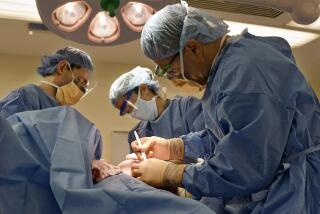Teens who lose weight with surgery also lose bone density, just like adults
- Share via
Teens who undergo the most common type of weight-loss surgery lose bone density, just like adults, researchers reported Monday. But the teens had above-normal bone density at the beginning of the study and their bone densities were still in the normal range after two years of followup, researchers reported in the journal Pediatrics. Both the authors and outside experts agreed, however, that the teens should be monitored for longer periods to ensure that there are no permanent effects from the surgery.
Obesity is a growing problem in the United States and teenagers are no exception. An estimated 18% of teens are obese and between 2% and 6% are thought to be extremely obese. Growing numbers of parents are turning to gastric bypass surgery, known formally as Roux-en-Y surgery, to help their children control weight. The procedure was once extremely rare in teens, but as many as 2,000 teens are now thought to undergo it each year, according to Dr. Thomas Inge of the Cincinnati Children’s Hospital Medical Center, a co-author of the new report.
Dr. Anne-Marie Kaulfers, who is now at the University of South Alabama, and her colleagues at Cincinnati Children’s studied 61 teens who underwent Roux-en-Y surgery, 10 boys and 51 girls. At the end of a year, the teens had lost a median of about 134 pounds. That was accompanied by a 7.4% decrease in bone mass, the equivalent of losing about 70 grams (2.5 ounces) of bone. That still left them within normal limits for their age group, however.
Researchers acknowledge there were several limitations to the study. Many of the adolescents didn’t have a whole-body bone density scan before their surgery because they couldn’t fit into the scanner. Also, the study was done retrospectively, so measurements of height and weight may not have been entirely accurate. Finally, the adolescents’ compliance in consuming vitamin D and calcium supplements, which are normally required after such surgery, could not be assessed.




